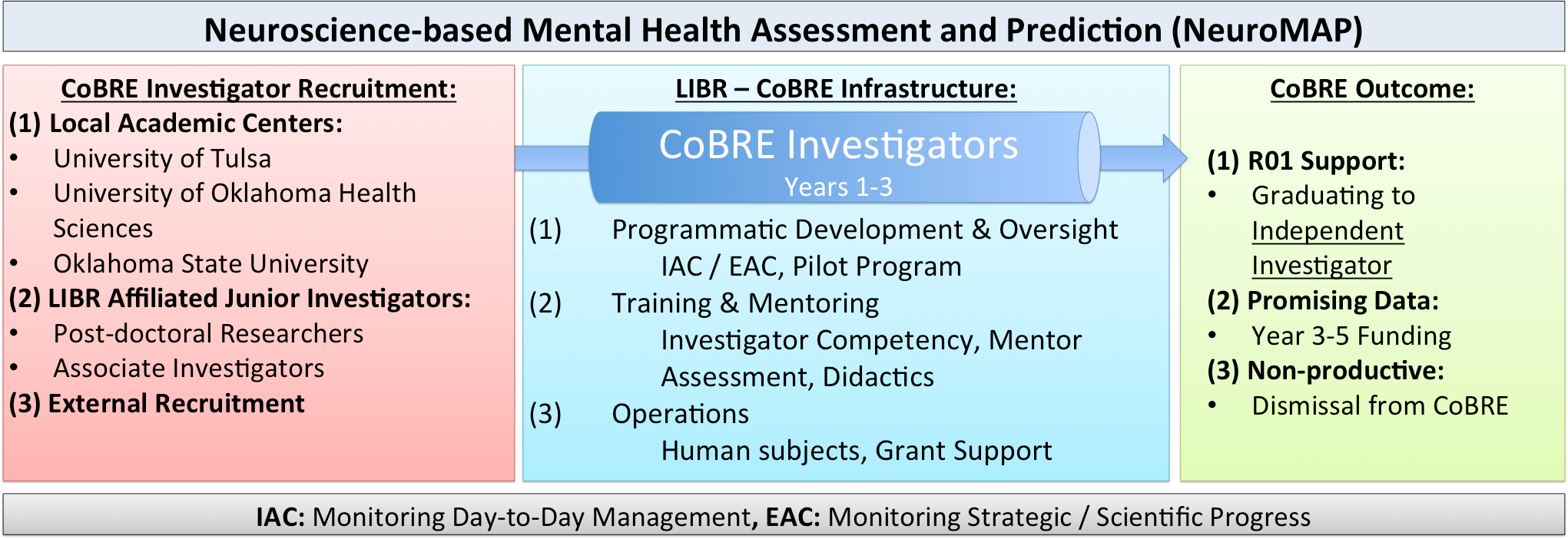The Laureate Institute for Brain Research (LIBR) has recruited investigators with an impressive track record of scientific productivity to lead the three NeuroMAP projects with innovative neuroscience-based research to use individual differences on several biological levels together with sophisticated statistical approaches to generate clinically meaningful predictions of risk and outcomes for mood, anxiety, and eating disorders.
Project 1:
Modulating Repetitive Negative Thinking Related Brain Networks in Young Adults with Depression
|
Why It Matters:
Depression impacts approximately 11% of young adults (aged 18-25). A major challenge within this mood disorder is Repetitive Negative Thinking (RNT) - persistent negative thoughts including rumination. Unfortunately, even with available treatments, many young adults continue to struggle with these relentless negative thoughts. What We are Investigating: Our team has identified distinct neural substrates associated with RNT. We employ real-time fMRI neurofeedback (rtfMRI-nf), a novel neuroimaging technique, aiming to better understand and counteract RNT. Our Research Strategy:
|
Project Outcomes:
Our long-term goal is to determine whether targeted modulation of the specific brain networks can mitigate the intensity of RNT, and consequently, alleviate the severity of depressive symptoms in young adults. Dr. Tsuchiyagaito, an Associate Investigator at LIBR, earned a Ph.D. in Child Development from Osaka University, and is a clinical psychologist with expertise in Cognitive Behavioral Therapy. Since joining LIBR in 2018, she has worked closely with Dr. Jerzy Bodurka on rtfMRI-nf applications for psychiatric disorders. As a CoBRE Research Project Leader, Dr. Tsuchiyagaito and her Research Assistant, Landon Edwards, investigate neuroscience-informed interventions for younger populations, with mentorship from Dr. Jonathan Savitz (LIBR) and Dr. Kate Fitzgerald (Columbia University/New York State Psychiatric Institute). |
Project 2:
Modulating Repetitive Negative Thinking Related Brain Networks in Young Adults with Depression
|
Why it matters:
Methamphetamine use disorder (MUD) is a rapidly accelerating public health concern, with over 30,000 overdose deaths in 2021 and very high relapse rates. Risky patterns of use and difficulties to reach lasting abstinence can be tied to abnormal decision-making behaviors and seem to be exacerbated by a poor mood. The absence of approved medication to treat MUD has placed an emphasis of developing effective behavioral interventions improving mood in MUD. What we are investigating: Focusing on how people adapt their behavior to make good choices and avoid bad ones, this project will identify and measure how mood interacts with decision-making in MUD, looking at both behavior and brain activity. Our research strategy:
|
Project Outcomes:
This project aims to causally identify the effects of mood on computational decision-making mechanisms and associated brain areas in MUD. This will provide a foundation for novel therapeutic strategies and targets to normalize abnormal decision-making sustaining chronic drug use in MUD. Dr. Gueguen is an Associate Investigator at LIBR since 2023. She received her Ph.D. in Cognitive Neuroscience from Grenoble Alps University for her neurocomputational study of human reinforcement learning and completed her doctoral training at Rutgers University where she gained expertise in functional neuroimaging in human addiction. As a CoBRE Research Project Leader, Dr. Gueguen is benefitting from the mentorship of Dr. Jennifer Stewart (LIBR) and Dr. Rita Goldstein (Icahn School of Medicine at Mount Sinai), both experts in neuroimaging studies in addiction. |
Project 3:
Neurobiology of Decision-Making in Adults With and Without Obsessive-Compulsive Disorder
|
Why It Matters:
Obsessive-compulsive disorder (OCD) is a leading cause of disability and is estimated to cost the United States $8.4 billion per year. Gold-standard treatments are unfortunately only effective in some cases, with limited treatment development over the past 50 years. One roadblock to treatment improvement is a limited understanding of the mechanisms underlying compulsions, the distinct behavioral patterns that characterize OCD. What We are Investigating: We use functional magnetic resonance imaging (fMRI) to investigate threat-related decision-making in individuals with and without OCD, to understand the neural basis of compulsive behavior. Our Research Strategy:
|
Project Outcomes:
Our long-term goal is to delineate neurobehavioral markers of OCD. This will aid in identifying viable psychological and neural targets for OCD treatment, ultimately improving the precision of OCD treatment and reducing the suffering associated with OCD. Dr. Berg, an Associate Investigator at LIBR, earned a Ph.D. in Psychology from the University of Minnesota. Dr. Berg has clinical experience working with OCD, anxiety and depression, substance use, and eating disorders. She has worked closely with Dr. Robin Aupperle since joining LIBR in 2021, with a focus on delineating the neural basis of maladaptive decision-making in clinical anxiety. Her CoBRE Research Project draws on additional mentorship from Dr. Blair Simpson (Columbia University). |
PAST RESEARCH PROJECT LEADERS
Investigating the Effects of Aversive Interoceptive States on Computations Underlying Avoidance Behavior and their Neural Basis
Ryan Smith, Ph.D.
Cerebellar Neuromodulation to Enhance Fear Extinction and Predict Response to Exposure Therapy
Yoon-Hee Cha, M.D.
Predicting Treatment Response to Exposure Therapy Using a Carbon Dioxide Habituation Paradigm (CHP) in Patients with High Levels of Anxiety
Justin Feinstein, Ph.D.
Response to Inflammatory Challenge in Major Depressive Disorder
Jonathan Savitz, Ph.D.
Neural Basis of Interoceptive Dysfunction and Anxiety in Anorexia Nervosa
Sahib Khalsa, M.D., Ph.D.
Augmented Mindfulness Training for Resilience in Early Life
Namik Kirlic, Ph.D.
Ryan Smith, Ph.D.
Cerebellar Neuromodulation to Enhance Fear Extinction and Predict Response to Exposure Therapy
Yoon-Hee Cha, M.D.
Predicting Treatment Response to Exposure Therapy Using a Carbon Dioxide Habituation Paradigm (CHP) in Patients with High Levels of Anxiety
Justin Feinstein, Ph.D.
Response to Inflammatory Challenge in Major Depressive Disorder
Jonathan Savitz, Ph.D.
Neural Basis of Interoceptive Dysfunction and Anxiety in Anorexia Nervosa
Sahib Khalsa, M.D., Ph.D.
Augmented Mindfulness Training for Resilience in Early Life
Namik Kirlic, Ph.D.




